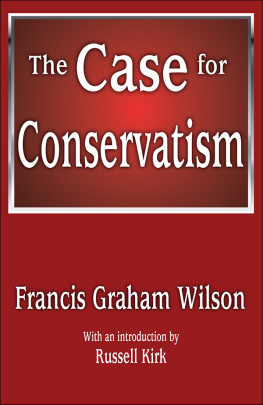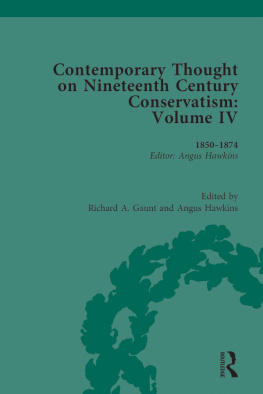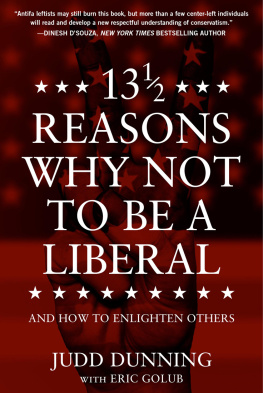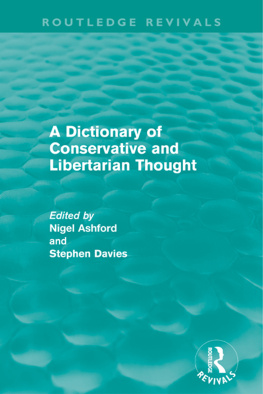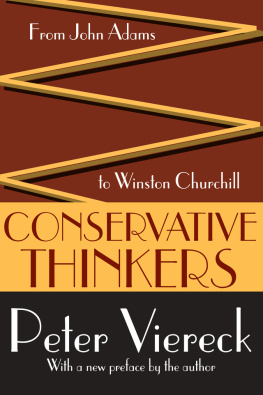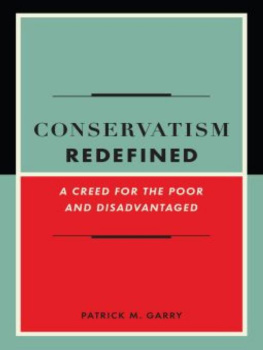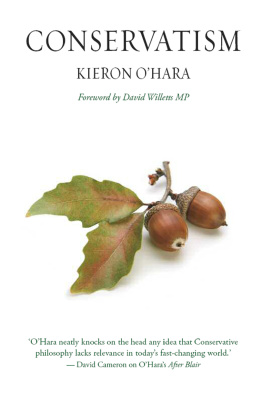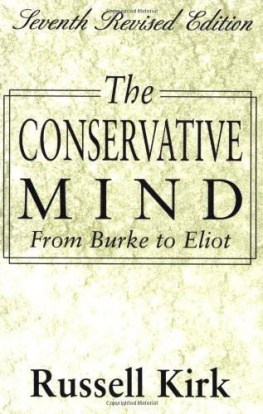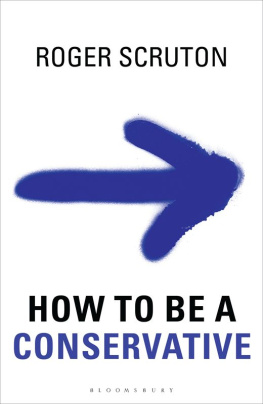Originally Published in 1951 by the University of Washington Press
Published 1990 by Transaction Publishers
Published 2017 by Routledge
2 Park Square, Milton Park, Abingdon, Oxon OX14 4RN
711 Third Avenue, New York, NY 10017, USA
Routledge is an imprint of the Taylor & Francis Group, an informa business
New material copyright 1990 by Taylor & Francis.
All rights reserved. No part of this book may be reprinted or reproduced or utilised in any form or by any electronic, mechanical, or other means, now known or hereafter invented, including photocopying and recording, or in any information storage or retrieval system, without permission in writing from the publishers.
Notice:
Product or corporate names may be trademarks or registered trademarks, and are used only for identification and explanation without intent to infringe.
Library of Congress Catalog Number: 89-27442
Library of Congress Cataloging-in-Publication Data
Wilson, Francis Graham, 1901
The case for conservatism: three lectures delivered at the University of Washington/Francis Graham Wilson; with a new introduction by Russell Kirk,
p. cm.
Originally published in 1951 by the University of Washington
PressT.p. verso.
ISBN 0-88738-322-X
1. ConservatismUnited States. 2. Political partiesUnited States. 3. United StatesPolitics and government. I. Title.
JC251.W558 1990
320.520973dc20
89-27442
ISBN 13: 978-1-4128-4234-1 (pbk)
ISBN 13: 978-0-88738-322-9 (hbk)
by Russell Kirk
Conservative and liberal political impulses have contended throughout the history of the United States. Neither liberalism nor conservatism in America has been an ideology. For an ideology is a body of rigorous dogmata, a political religion fanatically advocated, promising the terrestrial paradise. Rather, in America the terms conservative and liberal have signified general inclinations and prejudices, encountered in some degree within all major political parties, and much influencing prudential judgments. Thus one may speak of a liberal mentality or a conservative mentality, but not, in the United States, of major Conservative or Liberal parties.
The word conservative was introduced into American politics, in the 1840s and 1850s, by John C. Calhoun and by Orestes Brownson. Generally, throughout the nineteenth century, it was a label sought by public men. What is conservatism? Abraham Lincoln inquired in 1860. Is it not preference for the old and tried over the new and untried? The question was rhetorical: by asking it, Lincoln identified himself as a man of conservative mold. In the early years of the twentieth century, the basic assumptions of both Theodore Roosevelt and Woodrow Wilson were conservativewhatever may be said of their practical policies. Liberalism did not become a really popular political label in America until the ascent of Franklin Delano Roosevelt. From 1933 to recent years, liberal men and measures usually predominated in politics. Even Herbert Hoover called himself a liberal, with some reason.
All this commenced to change after the Second World War. A thoughtful revived conservatism emerged at the end of the 1940s and the beginning of the 1950s, coinciding with a popular reaction against latter-day liberalism in domestic policies and in foreign affairs. The present conservative drift in America began as an intellectual developmentin this, like the Fabian Society in Britain, which also did not triumph in public policy for some three decades after its early tracts appeared. But quite unlike the tightly concerted Fabian Society, the American intellectual renewal of conservative ideas about 1950 was unorganized and undirected, the work of isolated individual scholars and men of letters only slightly acquainted one with anothers work.
Some forty years ago, the emerging conservative thinkers perceived great difficulties into which the American Republic was slidingconfronting such adversity well before the general public became aware of the need for hard public decisions. Thus a measure of conservative imagination was already active as the public somewhat slowly and confusedly began to turn its back upon the politically dominant liberalism. The handful of conservatively inclined writers and scholars and those public men capable of serious reflection offered alternatives to the dogmas of liberalism. Those fresh or renewed conservative concepts worked on the publics discontent with the circumstances into which liberalism had brought the country: this union of thought and circumstance brought about a successful conservative movement.
It does not much signify that most activist conservatives of the 1990s will have read only scantly, if at all, the serious conservative books of half a century earlier: that is to be expected. Serious thought is vulgarized, filtered, and transmuted through newspaper editorials, Sunday sermons, college lectures, and paperback books and even television programs, until a crowd of people perhaps wholly unaware of the sources of their convictions come to embrace a particular view of politics or of morals. As Henry Adams remarked in his Education, during his editorship The North American Review reached only a few hundred subscribers; yet he found his journals views plagiarized, happily, in hundreds of newspapers. Thus the typical American citizen may have no notion that his vote is strongly influenced by certain books (forty or fifty years old) that he never has opened. Nevertheless, he will be so moved.
Until this renewal of conservative thought in America about the end of the 1940s, liberal dogmas in morals and politics had been triumphant almost everywhere in the United States. So late as December 1949, Lionel Trilling could write, with small fear of refutation,
In the United States at this time liberalism is not only the dominant but even the sole intellectual tradition. For it is the plain fact that nowadays there are no conservative or reactionary ideas in general circulation. This does not mean, of course, that there is no impulse to conservatism or to reaction. But the conservative impulse and the reactionary impulse do not, with some isolated and some ecclesiastical exceptions, express themselves in ideas but only in action or in irritable mental gestures which seek to resumble ideas.
Yet as if Trillings remark had called spirits from the vasty deep, no soon was his Liberal Imagination published than the literary and philosophical adversaries of liberal dogmata rose up in numbers.
At this point we require some preliminary definition. Any intellectual or political movement, if it is to achieve more than ephemeral popularity, must possess a body of common belief. I do not mean that it must, or should, possess an ideology: as H. Stuart Hughes wrote once, Conservatism is the negation of ideology. Rather, by a body of common belief I mean those general assumptions and prejudices derived from long consensus and social experience, so that they have become prescriptive.
Such a body of common belief still subsisted about 1950, and is still powerful four decades later. Here are some of its elements: persuasion that there exists a moral order, of more than human contrivance, to which we ought to conform human laws and customs as best we may; confidence in the American constitution, both the written constitution and the underlying unwritten constitution of tested usage and custom; attachment to representative government; suspicion of central direction in most matters; strong attachment to private property; preference for an economy in which work and thrift obtain their just rewards; love of countryan affection that extends beyond the present moment to the past and the future of the nation. The roots of these beliefs and impulses are not yet withered.

